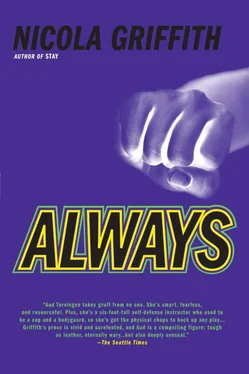“Plus,” he said, “I get to have lunch with all the big-shot investors, mostly famous CEO-type people.”
Else laughed. “But what he really likes is the people the famous CEOs attract.”
He smiled at her, then at me and Dornan. “I admit it. I like the shallow glitz.” And he and Dornan talked about the relationship between celebrity and big business, and when the conversation morphed back into a discussion of what was going on with Seattle biotech, I watched a cormorant airing its wings on one of the dock pilings.
“But of course a lot depends on a proposed South Lake Union real estate development project.”
I focused. “Real estate? How does that tie into biotechnology?”
“One of the city’s major developers is trying to get various concessions from local government—a spur from the proposed light rail line, relaxed commercial/residential zoning, and so on—in order to essentially create a biotech hub on the lake’s south shore.” I tried to visualize the area: the northern edge of downtown, then I realized that those were probably its lights shining across the water. “If he succeeds, then half the people I’m talking to would relocate, at favorable lease rates and certain city and county-level tax breaks. But in order to assure those favorable terms, they would in turn have to make concessions, commitments to employment levels, diversity quotas, environmental controls, and so on.”
Something in my brain began to tick.
“Naturally, all this affects pricing and long-term product viability, which are my major areas of concern.”
“So if the city’s getting less tax money, why is it a good thing?” Dornan said.
“Hubs are good because they attract other businesses. Like, for example, software nexuses in Silicon Valley and here in Seattle.”
“Coffee,” Dornan said, nodding. “Tully’s, Starbucks, Seattle’s Best.”
“Exactly.”
“Also beer and tea and chocolate,” he mused. “Seattle’s Best Chocolate, Dilettante, Fran’s, Red Hook, Stash, Tazo—though those might be Oregon, now that I come to think of it.”
All delivery mechanisms for nice, respectable drugs; all things that would get a Scandinavian through the winter.
“That’s the way it seems to work,” Eric said. “Once an industry perceives that the business climate is favorable, that the employee base has the right education, that others will travel to a particular city in order to take employment there, then it will relocate. Others follow.” He made a rolling motion. “It snowballs.”
“Ah.” Dornan nodded wisely. “Fashion.”
Eric laughed. “Of course. Though they’d hate to admit it.”
The cormorant launched itself from its perch and flew out over the water.
“Zoning,” I said. “Is it hard to change?”
“Not as hard as it should be,” my mother said.
“It depends,” Eric said, with a glance at her. “There are some good arguments for keeping zoning flexible. But perhaps there’s a particular reason you asked?”
“My warehouse.” My mother looked at me. Dornan looked at his wineglass and sighed. “I was thinking of selling it, only now I discover that that’s exactly what someone wants.” And I explained what I believed had been happening. “This morning I found out my agent has run off, and taken my files and a few others with her. Her assistant tells me that she’d been negotiating to purchase several properties along that stretch of the Duwamish, all industrial property. Only he couldn’t figure out why, who she was negotiating for, or who would be interested in it. So I was just thinking, maybe she’s found a way to change the zoning. How would she go about that?”
“City or county council vote. Most of the time they just rubber-stamp the recommendations of a zoning committee chaired by one councillor and half a dozen civil servants. They will usually indulge in a pro forma public meeting before formulating their recommendations. For high-visibility issues, though, the individual councillors will make up their own minds. That is, they’ll let interested parties make it up for them by means of campaign contributions, promises of future development dollars, and public and behind-the -scenes support for the councillors’ pet projects.”
“Buying votes—that simple?”
“Pretty much.”
“The way of the world,” my mother said. “Favors for favors. For example, that’s one of the reasons I’m here: the Norwegian government’s licensing agreement with a large software company is ending shortly and there are interesting new parameters to explore, particularly relating to security. I’m talking to the executive team purely informally, as a favor to the Labour Party.”
I forgot the zoning issue. “The party, not the government?”
She nodded.
Party politics operated only in the domestic arena. “You’re thinking of going back to Norway.”
Her face smoothed into that automatic pseudo-candid expression all career diplomats—all politicians—learn, but then she paused and glanced at Eric. He shrugged: your daughter, your decision. She took a deep breath. “Yes.”
“What have they offered you?”
“The Ministry of Culture and Education. For now.”
“Well, well, well.”
“What?” Dornan said, looking from me to Else to Eric and back again. “What?”
Eric took his wife’s hand. “Aud has just discovered that her mother has greater ambition than she knew.”
“You’re aiming for the top,” I said.
“Yes.” Now that she had made up her mind to tell me, she seemed quite calm about it.
“What’s your timetable?”
"Move back later this year, assume the junior cabinet position next year, then ...”
“Madame Prime Minister.” We all looked at each other. “But why?”
“Victor Belaunde,” she said. “Do you remember?”
It had been a long time, but Belaunde, onetime Peruvian ambassador to the UN, had been quoted in our household all through my childhood. My mother was very fond of quotations.
I said from memory, “When there is a problem between two small nations, the problem disappears. When there is a problem between a big country and small country, the little country disappears. When there is a problem between two big countries, the United Nations disappears.”
“It’s even more true today than it was then. Norway needs to be bigger. We have work to do. But the sense of importance must come from inside. That’s what I want to do.”
“You want to change the world.”
She didn’t deny it.
Dornan looked around the table, shook his head, and said, “It’s genetic.” Which everyone seemed to find funnier than I did.
“Aristotle,” Eric said, with the air of a magician producing a rabbit from the hat. “Humans have a purpose in the world, and that purpose is to fulfill their destiny.”
“Destiny is a pretty creepy word,” Dornan said, and then, with a disarming smile, “depending on the context.”
“Quite so. There again, Aristotle also said that greatness of soul is having a high opinion of oneself.”
“Yes,” Dornan said in his best Trinity debating voice, “but do we believe him or Socrates when it comes to moral action? Socrates declared that it’s impossible to know the right thing and not do it. Aristotle, on the other hand, asserted that one can have the knowledge but fail to act because of lack of control or weakness of will.” He was enjoying their surprise. “Straw poll: Aristotle or Socrates?”
“Aristotle,” said Eric.
“Aristotle,” my mother said, but more slowly.
They looked at me. “Socrates,” I said. “Because it’s all about what you mean by ‘knowledge.’ And ‘the right thing.’ ”
They looked interested.
Читать дальше












